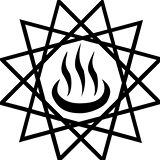Reciting an Orphic Hymn
by Melissa Gold
Eos is one of my favorite “minor” deities. I particularly like the Orphic Hymn to her. Here is my translation of it:
78. To Eos (Dawn)
The incense is “manna”
Hear, goddess, bringing to mortals light-bearing day,
Brilliant Dawn, blushing throughout the cosmos,
messenger of great noble god Titan,
you who sends the gloom and scintillating transit of night
under the lower parts of earth by your risings;
of deeds you are the guide, of livelihood the minister to mortals,
you in whom delights the race of speaking mortals; there is no one
who flees your sight since it is higher;
when sweet sleep from eyelids you shake away,
every mortal rejoices, every creeping thing and the other tribes
of four-footed and of winged ones and of the many-raced sea;
for all livelihood that can be worked you provide to mortals.
Thus, blessed, pure one, to initiates may you increase your holy light.
Would you like to know how it sounds in Greek? Below is a transliteration of the Greek in a way that captures the dactyllic hexameter of the original. Dactyllic hexameter (the meter of the poems, the Iliad and the Odyssey) is based on the length of time that each syllable is held while reciting (slow or quick). An dactyl is like your finger, which has one long bone (slow) and two short ones (quicks). And hexameter means six measures (or six “fingers”, if you will). There’s no rhyme scheme. In its pure form, dactyllic hexameter goes like this:
SLOW-quick-quick / SLOW-quick-quick / SLOW-quick-quick / SLOW-quick-quick / SLOW-quick-quick / SLOW-quick-quick
Sometimes for two quicks, you get a SLOW, so the result is a / SLOW-SLOW /
And often in a line you get more / SLOW-SLOW / combos than / SLOW-quick-quick / combos.
You will usually find a mix rather than a “pure” line of dactyllic hexameter.
And usually the last measure is two SLOWS pronounced as / SLOW-quick /.
So, below, where you see a syllable in CAPS, it’s a SLOW. Where you see a syllable in lower case letters, it’s a quick. Practice saying the line until you can hear the ancient rhythm. The
syllables of each word are connected by hyphens.
Note: the pronunciation is in MODERN Greek, since no one can agree on how ancient Greek was pronounced. The advantage to learning the poem in Modern Greek is that your fellow worshipers of the Gods in Greece will understand you. A pronunciation guide follows the transliteration.
ee-OYS (of Eos, Dawn)
KLOU-thee the-AH, THNEE-TEES fa-e-SEEM-vro-ton EE-mar a-GOU-sa,
EE-OHS LAM-bro-fa-EES e-ree-THE-no-me-NEE ka-ta KOS-mon,
ANG-GEL-TEE-ra the-OU me-ga-LOU TEE-TA-no a-GAV-on,
EE NEEK-TOS zo-fer-EEN te ke E-o-lo-KHRO-ta po-REE-een
ΑΝ-to-lee-ES TES SES PEM-PEES hee-po NER-te-ra ΥE-ees
ER-GON EE-YEE-TEE-ra ee-OU pro-po-LE THNEE TEE-seen
EE KHE-REE THNEE-TON mer-ro-PON ye-nos OU-de tees ES-teen
OS FEV-YEE TEEN SEEN OP-SEEN ka-thee-PER-ter-on OU-san;
EE-nee-ka TON glee-keen EEP-non ap-OH ble-far-ON ap-o-SEE-sees,
PAS de vro-TOS YEE-THEE PAN ER-pe-ton AL-la te FEE-la
ΤΕ-tra-pa-DON PTEE-ΝΟΝ te ke ΕΕ-na-lee-ΟΝ po-lee-ΕΤΗ-non;
PAN-ta gar ER-ga-see-MON bee-o-TAN THNEE-TEE-see po-REE-zees.
AL-la ma-KER AG-NEE MEES-TES i-e-RON fa-os AV-xees
Guide:
e = e as in bet
ee = ee as in seen
a = a as in ah
th = th as in think
d = th as in them
kh = ch in German ich (or an h as in English high)
thn = thn (say the th and the n together)
pt = pt (say both the p and the t)
Now you are ready to Greet the Dawn! At daybreak, face east, raise your arms palms up and recite the poem. You can light some incense before you recite.
